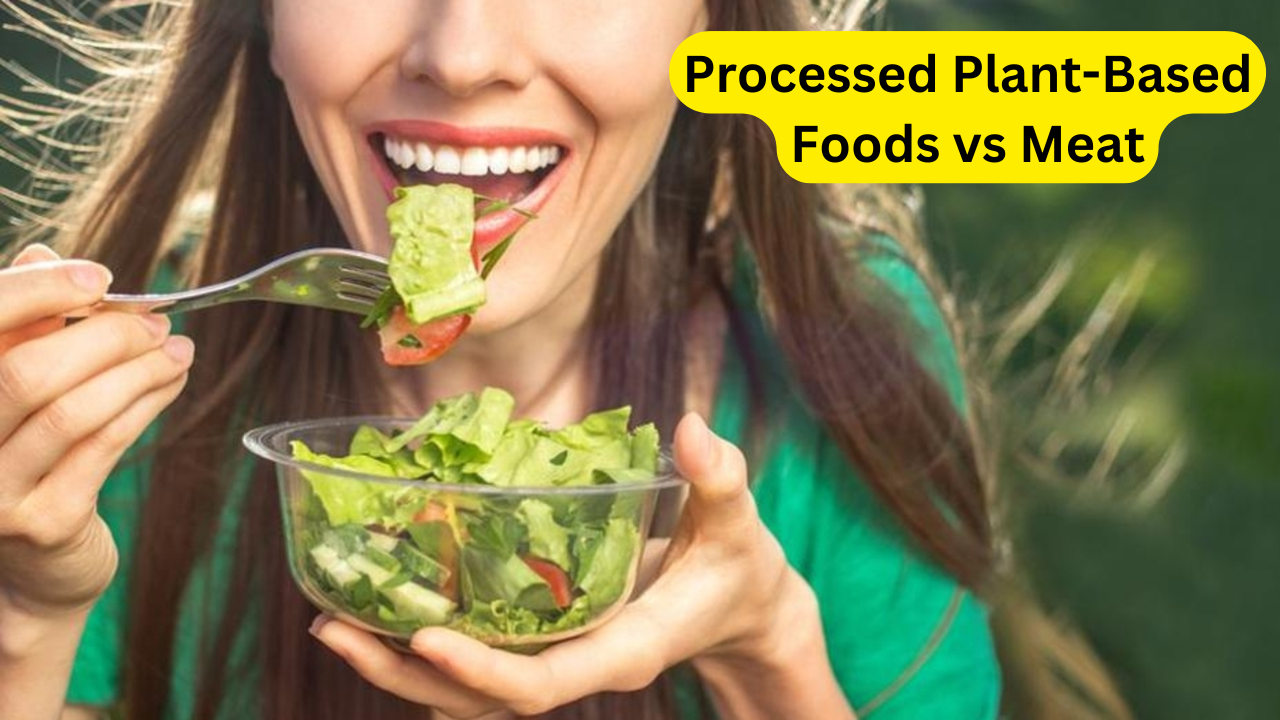Processed Plant-Based Foods vs Meat: For years, health experts have warned that processed foods are a surefire way to pack on pounds. However, groundbreaking research from the Physicians Committee for Responsible Medicine (PCRM) suggests that not all processed foods are created equal. In fact, plant-based processed foods may not contribute to weight gain like their animal-based counterparts. This revelation challenges conventional wisdom and offers a surprising dietary loophole for those looking to manage their weight without giving up convenience.
The study, published in Nutrition & Metabolism, reveals that choosing plant-based processed foods over animal-based ones can be a game-changer for weight management. Dr. Hana Kahleova, Ph.D., director of clinical research for PCRM, explains, “Our research shows that choosing a bagel instead of bacon for breakfast or a veggie burger instead of a hamburger for dinner is the best option if you are looking to lose weight.” This finding is particularly significant in a world where processed foods are often vilified, offering a nuanced perspective on how different types of processed foods impact our health.
So, what makes plant-based processed foods different from their animal-based counterparts? The answer lies in their nutritional composition and how our bodies metabolize them. While both types of processed foods can be high in calories, plant-based options tend to be lower in saturated fats and free from cholesterol, which are commonly found in animal products. Additionally, plant-based foods are often richer in fiber, which promotes satiety and helps regulate blood sugar levels, reducing the likelihood of overeating. This article dives deep into the science behind this dietary loophole, exploring how you can make smarter food choices without sacrificing convenience.
Click here: Struggling After Childbirth? Try These Postnatal Yoga Asanas for Postpartum Recovery
The Science Behind Processed Foods and Weight Gain
What Are Processed Foods?
Processed foods are any foods that have been altered from their natural state, either for safety reasons or convenience. This includes everything from canned vegetables and frozen meals to snacks like chips and cookies. While processing can make foods more accessible and longer-lasting, it often involves adding salt, sugar, and unhealthy fats, which can contribute to weight gain and other health issues.
The Role of Animal-Based Processed Foods
Animal-based processed foods, such as bacon, sausages, and deli meats, are often high in saturated fats and cholesterol. These components are linked to weight gain, inflammation, and an increased risk of chronic diseases like heart disease and diabetes. Additionally, animal products lack fiber, which means they don’t keep you full for long, leading to overeating and weight gain over time.
The Plant-Based Advantage
Plant-based processed foods, on the other hand, are typically lower in saturated fats and free from cholesterol. They also contain fiber, which slows digestion and helps you feel fuller for longer. This can prevent overeating and support weight management. While some plant-based processed foods may still be high in calories, their overall nutritional profile makes them a healthier choice compared to animal-based options.
Findings from the PCRM Study
The Study Design
The PCRM study analyzed the dietary habits of participants who consumed either plant-based processed foods or animal-based processed foods. Researchers tracked their weight, body composition, and overall health over a set period. The results were clear: those who opted for plant-based processed foods experienced less weight gain and better metabolic health compared to those who consumed animal-based processed foods.
Why Plant-Based Processed Foods Don’t Cause Weight Gain
The study highlighted several reasons why plant-based processed foods are less likely to contribute to weight gain:
- Lower Caloric Density: Many plant-based foods are less calorie-dense than animal-based foods, meaning you can eat more without consuming excess calories.
- High Fiber Content: Fiber promotes satiety and helps regulate blood sugar levels, reducing cravings and overeating.
- Absence of Harmful Fats: Plant-based foods are free from cholesterol and typically lower in saturated fats, which are linked to weight gain and inflammation.
Practical Implications
The findings suggest that you don’t have to give up processed foods entirely to manage your weight. Instead, focus on choosing plant-based options like veggie burgers, plant-based sausages, and whole-grain snacks. These choices allow you to enjoy the convenience of processed foods without the negative health impacts associated with animal-based products.
How to Incorporate Plant-Based Processed Foods into Your Diet

Breakfast Options
- Swap bacon for a whole-grain bagel with avocado or nut butter.
- Choose plant-based breakfast sausages or tofu scramble instead of eggs and sausage.
Lunch and Dinner Ideas
- Opt for veggie burgers or plant-based deli slices instead of hamburgers or cold cuts.
- Try lentil or chickpea pasta instead of traditional pasta with meat sauce.
Snacks and Desserts
- Reach for air-popped popcorn, roasted chickpeas, or fruit instead of chips or cookies.
- Enjoy dairy-free ice cream or dark chocolate as a healthier dessert option.
Also read: 2025 MG 4 Electric Hatchback Debuts with Cyberster-Inspired Makeover: A Comprehensive Review
Processed Plant-Based Foods vs Meat Conclusion
The debate between processed plant-based foods and meat has taken a surprising turn with the latest research from the Physicians Committee for Responsible Medicine (PCRM). While processed foods have long been associated with weight gain, this study shows that not all processed foods are created equal. By choosing plant-based options over animal-based ones, you can enjoy the convenience of processed foods without the negative health impacts. This revelation offers a practical solution for those who struggle to balance convenience and health in their diets.
This dietary loophole is particularly valuable in today’s fast-paced world, where convenience often trumps health considerations. By making small swaps—like choosing a veggie burger over a hamburger or a bagel over bacon—you can take control of your weight and overall health. The key is to focus on the nutritional composition of the foods you eat, rather than simply avoiding processed foods altogether. Plant-based processed foods, with their lower saturated fat content and higher fiber levels, provide a healthier alternative that supports weight management.
The PCRM study underscores the importance of a balanced, plant-based diet. While whole, unprocessed foods should always be the foundation of a healthy diet, incorporating plant-based processed foods can be a practical and effective way to manage your weight. This approach allows you to enjoy the convenience of modern food options without sacrificing your health goals. It’s a win-win for busy individuals who want to eat well without spending hours in the kitchen.
Ultimately, the findings challenge the blanket condemnation of processed foods and encourage a more nuanced understanding of their role in our diets. Not all processed foods are harmful, and plant-based options can be a valuable tool for weight management. By making informed choices and prioritizing plant-based processed foods, you can enjoy the best of both worlds: convenience and health.
So, the next time you’re faced with a choice between a plant-based and animal-based processed food, remember: the former may just be the smarter option for your waistline and your health. With this knowledge, you can navigate the grocery store aisles with confidence, knowing that you’re making choices that support your long-term well-being.
Processed Plant-Based Foods vs Meat FAQs
1. Are all plant-based processed foods healthy?
Not necessarily. While plant-based processed foods are generally healthier than animal-based ones, some can still be high in salt, sugar, and unhealthy fats. Always check the nutritional label and opt for options with minimal additives and whole-food ingredients. For example, a veggie burger made with whole grains and vegetables is a better choice than one loaded with artificial flavors and preservatives.
2. Can I lose weight by switching to plant-based processed foods?
Yes, switching to plant-based processed foods can support weight loss, especially if you replace high-calorie, high-fat animal products with lower-calorie, fiber-rich plant-based options. However, portion control and overall dietary balance are still important. Pairing plant-based processed foods with whole, unprocessed foods like fruits, vegetables, and legumes can enhance your weight loss efforts.
3. What are some examples of healthy plant-based processed foods?
Healthy options include veggie burgers, whole-grain bread, plant-based sausages, lentil pasta, and dairy-free yogurt. Look for products with simple ingredients and minimal added sugars or fats. For instance, a plant-based sausage made with pea protein and spices is a better choice than one with a long list of unrecognizable ingredients.
4. Do plant-based processed foods provide enough protein?
Many plant-based processed foods are fortified with protein from sources like peas, soy, and lentils. However, it’s important to ensure you’re meeting your protein needs by incorporating a variety of plant-based protein sources into your diet, such as beans, tofu, tempeh, and nuts. Combining these with plant-based processed foods can help you achieve a balanced intake of protein.
5. Can I still eat animal products occasionally?
Yes, occasional consumption of animal products is unlikely to derail your health goals. However, the PCRM study suggests that reducing or eliminating animal-based processed foods can have significant benefits for weight management and overall health. Aim to make plant-based choices the majority of your diet, and reserve animal products for special occasions or small portions. This approach allows you to enjoy flexibility while prioritizing your health.









